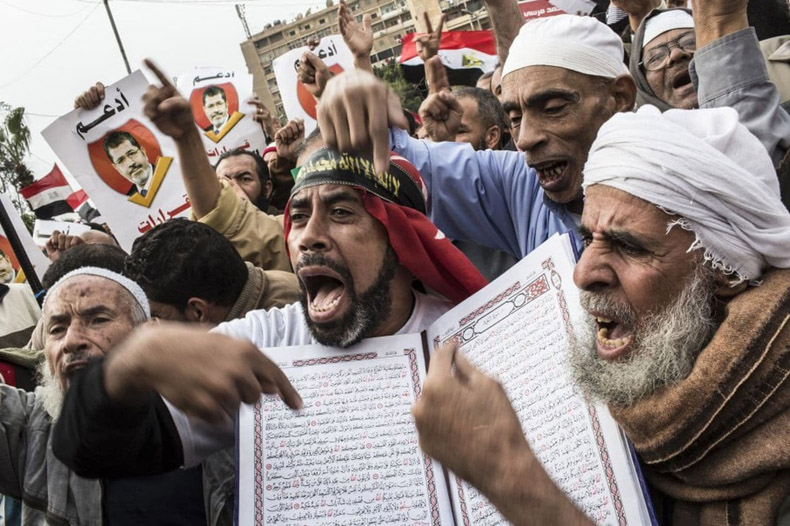However I think we should understand that those views are on the extreme edge of Islamic belief and are a mistaken and distorted view of what Islam means to most of it's believers. Some, who are Islamophobic of course have no desire to hear this 'cause it upsets their hatred of Muslims and Islam in particular. For them, Islam has no room for forgiveness and repentance.
[Source]Forgiveness and Repentance in Islam
God has granted intellect to human beings. The intellect entails responsibility. The more intellect a person has, the more he/she is responsible.
When the intellect is missing, the responsibility is also not there. Little children are not held responsible, because their intellect has not yet developed. The insane are not responsible, because they have lost the intellectual capacity. However, part of our being human is also that we make mistakes. Sometime we make mistakes without deliberation and intention. But sometime we knowingly and deliberately sin and do wrong to others.
It is said: “To err is human and to forgive is divine.” Both parts of this statement are very true. As human beings we are responsible, but we do also make mistakes and we are constantly in need of forgiveness. Islam speaks about two elements of forgiveness: a) God’s forgiveness; b) Human forgiveness. We need both, because we do wrong in our relations to God as well as in our relations to each other.
There are many names of God given in the Qur’an. They are called “Most beautiful names” and they indicate many different and diverse attributes and qualities of God. Some of these names are related to His mercy and forgiveness. Let us look at some of these names:
1. Al-Ghafoor (The Most Forgiving): This name occurs in the Qur’an more than 70 times. There are other names from the same root, such as Ghafir and Ghaffar. The meaning of the Arabic word “ghafara” is to cover, to hide and from it comes the meaning “to excuse,” “to pardon,” “to remit” and “to forgive.” God does all these things. In the Qur’an, it is mentioned that God does not forgive the Shirk (without repentance) but He may forgive every other sin for whomsoever He wills. (4:116) We must turn to God to seek His forgiveness.
2. Al-`Afuw (The Pardoner): This has another part of forgiveness. This name occurs in the Qur’an five times. Literally, the word ‘Afw means “to release,” “to heal,” “to restore,” “to remit.” Thus in relation to God it means “to release us from the burden of punishment due to our sins and mistakes; to restore our honor after we have dishonored ourselves by committing sins and making mistakes.” Sometimes in the Qur’an both names, Afuw and Ghafoor, come together.
3. Al-Tawwab (The Acceptor of Repentance): This name of God is mentioned in the Qur’an about 11 times. Allah accepts repentance of those who sincerely repent and turn to him. The word “tawwab” gives the sense of “oft-returning,” which means that He again and again accepts the repentance. We make sins and mistakes then we repent, He accepts our repentance. Then again we commit sins and make mistakes and when we repent, He again very kindly accepts us and gives us another chance.
4. Al-Haleem (The Clement): This name is mentioned fifteen times in the Qur’an. This means that God is not quick to judgment. He gives time. He forebears and is patient to see His servant return to Him.
5. Al-Rahman and Al-Rahim (The Most Merciful and Compassionate): These names are the most frequent in the Qur’an. Al-Rahman is mentioned 57 times and al-Raheem is mentioned 115 times. Al-Rahman indicates that God’s mercy is abundant and plenty and Al-Raheem indicates that this is always the case with God. God is full of love and mercy and is ever Merciful.
The Qur’an teaches that God is a Judge and He also punishes, but God is not bound to punish. The justice of God, according to Qur’an is that God does not and will not inflict undue punishment on any person. He will not ignore the good of any person. But if He wishes to forgive any sinner, He has full freedom to do that. His mercy is unlimited and His love is infinite.
There are many verses in the Qur’an and sayings of the Prophet Muhammad (peace be upon him) on God’s love, mercy and forgiveness. In one of the prayers that the Prophet taught, he said: “O God, You are most Forgiving One, You love to forgive, so forgive me.” (At-Trimidhi & Ibn Majah). We need God’s mercy and forgiveness all the time. It is wrong to assume at any time that one will find eternal salvation without the forgiveness of God.
Just as it is important to believe in God’s mercy and forgiveness, it is also necessary to base human relations on forgiveness. We cannot expect God’s forgiveness unless we also forgive those who do wrong to us. Forgiving each other, even forgiving one’s enemies is one of the most important of Islamic teaching. In the Qur’an, God has described the Believers as: “those who avoid major sins and acts of indecencies and when they are angry they forgive.” (42:37)
In the same chapter, God says: “The reward of the evil is the evil thereof, but whosoever forgives and makes amends, his reward is upon God.” (42:40) In another place the Qur’an says: “If you punish, then punish with the like of that wherewith you were afflicted. But if you endure patiently, indeed it is better for the patient. Endure you patiently. Your patience is not except through the help of God…” (16:126-27)
In one the famous sayings of the Prophet (peace be upon him) it is reported that he said that God commanded him about nine things. One of them he mentioned was “that I forgive those who do wrong to me.”
Prophet Muhammad was the most forgiving person. He was ever ready to forgive his enemies. When he went to Ta’if to preach God’s message to its people, they mistreated him. They abused him and hit him with stones. He left the city humiliated and wounded. When he took shelter under a tree, God’s angel appeared to him and told him that God was very angry with the people of Taif and sent him to destroy them because they mistreated God’s beloved Prophet. The Prophet prayed to God to save the people of Ta’if, because what they did was out of their ignorance. He said: “O Allah, guide these people, because they did not know what they were doing.” (Al-Bukhari)
When he entered the city of Makkah after the victory, the Prophet had in front of him some of his staunchest enemies. Those who fought him for many years, persecuted his followers and killed many of them. Now he had full power to do whatever he wanted to punish them for their crimes. It is reported that the Prophet asked them: “What do you think I shall do to you now?” They expected nothing but retaliation and pleaded for mercy. The Prophet said, “Today I shall say to you what Yusuf (Prophet Joseph) said to his brothers: ‘No blame on you today. Go, you are all free’.” (Al-Albani)
Soon they all came and accepted Islam at his hands. He forgave even Hend who had caused the murder of his uncle Hamza. After killing him, she had his body mutilated and chewed his liver. When she accepted Islam, the Prophet even forgave her.
A very striking example of forgiveness we find in the Qur’an in reference to the most unfortunate event of “Slander of Aisha.” Some hypocrites of Madinah accused her. They tried to put dirt on her noble character. One of the slanderers turned out to be Mistah, the cousin of Aisha’s father Abu Bakr. Abu Bakr used to give financial help to this young man. After he slandered his daughter, Abu Bakr vowed not to help him anymore. But God reminded Abu Bakr and through him all the Believers: “Let not those among you who are endued with grace and amplitude of means resolve by oath against helping their kinsmen, those in want and those who migrated in the path of God. Let them forgive and overlook. Do you not wish that God should also forgive you. Indeed God is Oft-Forgiving, Most Merciful.” (24: 22)
Abu Bakr came out of his home and said: “Yes, indeed, I do want God’s forgiveness. He did not only continue to help him but he increased his allowance. Islam emphasizes justice and punishment of the wrong doers, but it equally strongly emphasizes mercy, kindness and love. Justice, law and order are necessary for the maintenance of a social order, but there is also a need for forgiveness to heal the wounds and to restore good relations between the people. We must keep in mind that as much as we need God’s forgiveness for our own sins and mistakes, we must also practice forgiveness toward those who do wrong to us.
[Source]Islamic teachings about forgiveness
Islamic teachings about forgiveness are found in verses in the Qur'an, which strongly encourage Muslims to forgive wrongdoing.
The term used to forgive people who have done wrong is 'to pardon', just as Allah will forgive people on the Day of Judgement for things which they have done.
Muslims believe no person is perfect, and everyone is capable of wrongdoing and deserves forgiveness.
Qur'an 64:14"O you who have believed, indeed, among your spouses and your children are enemies to you, so beware of them. But ... if you pardon and overlook and forgive - then indeed, Allah is Forgiving and Merciful."
Qur'an 42:30"And whatever strikes you of disaster - it is what your hands have earned; but he pardons much."
Case study – Tariq Khamisa
Azim Khamisa's 20-year-old son, Tariq, who was working part-time as a pizza delivery person in San Diego in the USA to fund his studies, was fatally shot in 1995. He was killed by a young teenager called Tony Hicks, who belonged to a gang known as the Black Mob. Hicks was the first 14-year-old to be put on trial as an adult in the state of California. He was found guilty, and received a 25-year prison sentence for the murder of Tariq.
Azim Khamisa set up the Tariq Khamisa Foundation in his son's name. The organisation is committed to “stopping children from killing children”.
Azim is a Sufi Muslim and, following the loss of his son, he turned to his faith. Through prayer, he was eventually able to forgive Tony.
Azim Khamisa"You do forgiveness for yourself, because it moves you on. The fact that it can also heal the perpetrator is the icing on the cake."



